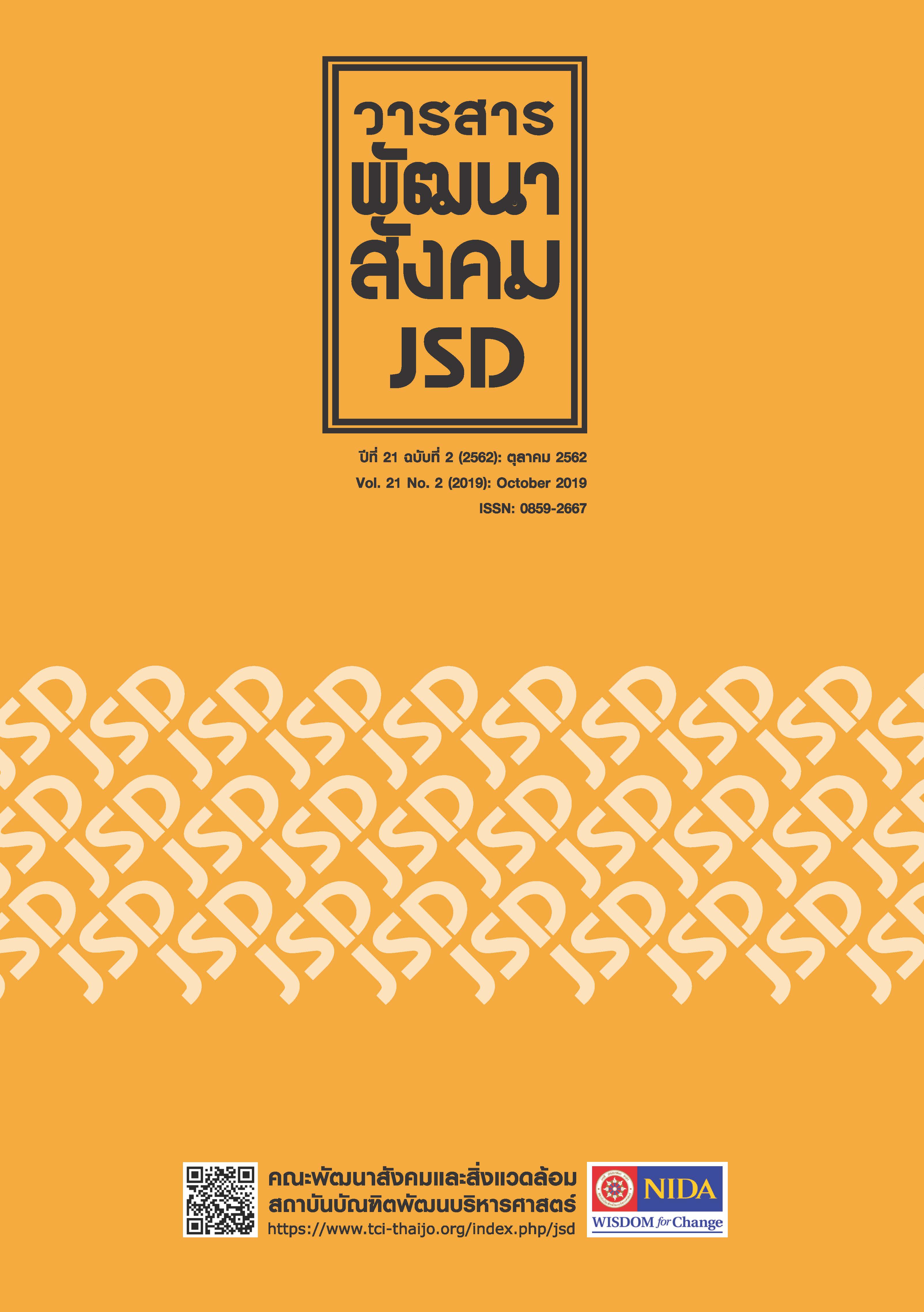Approach to Community Empowerment for Health Promotion
Main Article Content
Abstract
The objective of this article is to study the concept of community empowerment, health promotion, and the application of the concept of community empowerment for driving health promotion. This study deployed the documentary research and the author’s experience of development work, the study found that the concept of good health has been changed from emphasizing treatment and rehabilitation to promotion and prevention. The new concept of health promotion at the community level is to strengthen community in order that they can manage and control ‘health determinants’ and promoting health by themselves.
Article Details
How to Cite
Phourai, P. . (2019). Approach to Community Empowerment for Health Promotion. Journal of Social Development and Management Strategy, 21(2), 64–77. Retrieved from https://so04.tci-thaijo.org/index.php/jsd/article/view/222401
Section
บทความวิจัย Research Article
References
Coffry, M. & Dugdill, L. (2013) “Health and Well-being”, in Dwyer, W. & Shaw, S. (eds.) An Introduction to Social Policy, London: Sage Publications.
Freire, P. (1972) Cultural Action for Freedom, Middlesex: Penquin Books.
Freire, P. Pedagogy of the Oppressed, Middlesex: Penquin Books.
Labonte, R., Woodard, G. B., Chad, K., & Laverack, G. (2002). “Community Capacity Building: A Parallel Track for Health Promotion Programs”. Canadian Journal of Public Health, 93(3), pp. 181-182.
Laverack, G. (2006). Improving Health Outcomes through Community Empowerment: A Review of the Literature. Journal of Health, Population and Nutrition, pp. 113-120.
Margaret & Dugdill, L. (2013). “Health and Well-being”. In Dwyer, P. & Shaw, S. (eds.) An introduction to Social Policy. London: Sage Publications.
Office of the National Health Commission. (2007). National Health Act. Nonthaburi: Pimluk.
Phalasuek R., et al, (2018). “Participatory Action Research: Development Process Participating Community Health Promotion”. [in Thai]. Journal of Nursing College Network and Southern Public Health. Vol 5 No 1. Pp.211-223.
Pholsri, S. (1990) Theory and Principles of Development. Bangkok: O.S. Printing House.
Ratchachon O. (2015). The Process of Creating a Strong, Self-reliant Community. Bangkok: Odean Store.
Samakkethum, S. (2011). Empowerment of the Powerless. Bangkok: the company celebrates you - CSB.Ltd.
Srirattanaball, A. (2017). Health Promotion and Community Empowerment, Unpublished Document.
Thai Health Promotion Foundation. (2001). Health Promotion Fund Act, BE 2544 (2001) Bangkok: Thai health Promotion Foundation.
Thasniyom N. (2011). “Health Promotion: Empowerment Dimension”. [in Thai]. Journal of Nursing and Health, Vo. 25, No. 2-3, pp. 103-114.
Tiangthum V. (2015). Community Capacity Building: Concept and Applications. Bangkok: Danex Inter Corporation.
Tienhongsakun W. (1986). Community Development according to the Western Philosopher. Bangkok: O.S. Printing House.
Umprommi, S. (2013). Important development of health promotion, The World Conference on Health Promotion. Bangkok: Academic Welfare Program Praboromarajonok Institute.
Valaisatian, P. et al. (2003). Processes and Techniques of Work of Developers. Bangkok: Usa Printing.
Wallerstein, N. (1993). “Empowerment and Health: The Theory and Practice of Community Change”. Community development journal, 28(3) pp. 218-227.
WHO (2019) Health Impact Assessment (HIA) – The Determinants of Health, Available on https://www.who.int/hia/evidence/doh/en/ (retrieved 31 May 2019).
Wiangsang A., et al. (2005). Participatory Monitoring and Evaluation. Bangkok: Learning Enhancement for Happy Communities Project.
Freire, P. (1972) Cultural Action for Freedom, Middlesex: Penquin Books.
Freire, P. Pedagogy of the Oppressed, Middlesex: Penquin Books.
Labonte, R., Woodard, G. B., Chad, K., & Laverack, G. (2002). “Community Capacity Building: A Parallel Track for Health Promotion Programs”. Canadian Journal of Public Health, 93(3), pp. 181-182.
Laverack, G. (2006). Improving Health Outcomes through Community Empowerment: A Review of the Literature. Journal of Health, Population and Nutrition, pp. 113-120.
Margaret & Dugdill, L. (2013). “Health and Well-being”. In Dwyer, P. & Shaw, S. (eds.) An introduction to Social Policy. London: Sage Publications.
Office of the National Health Commission. (2007). National Health Act. Nonthaburi: Pimluk.
Phalasuek R., et al, (2018). “Participatory Action Research: Development Process Participating Community Health Promotion”. [in Thai]. Journal of Nursing College Network and Southern Public Health. Vol 5 No 1. Pp.211-223.
Pholsri, S. (1990) Theory and Principles of Development. Bangkok: O.S. Printing House.
Ratchachon O. (2015). The Process of Creating a Strong, Self-reliant Community. Bangkok: Odean Store.
Samakkethum, S. (2011). Empowerment of the Powerless. Bangkok: the company celebrates you - CSB.Ltd.
Srirattanaball, A. (2017). Health Promotion and Community Empowerment, Unpublished Document.
Thai Health Promotion Foundation. (2001). Health Promotion Fund Act, BE 2544 (2001) Bangkok: Thai health Promotion Foundation.
Thasniyom N. (2011). “Health Promotion: Empowerment Dimension”. [in Thai]. Journal of Nursing and Health, Vo. 25, No. 2-3, pp. 103-114.
Tiangthum V. (2015). Community Capacity Building: Concept and Applications. Bangkok: Danex Inter Corporation.
Tienhongsakun W. (1986). Community Development according to the Western Philosopher. Bangkok: O.S. Printing House.
Umprommi, S. (2013). Important development of health promotion, The World Conference on Health Promotion. Bangkok: Academic Welfare Program Praboromarajonok Institute.
Valaisatian, P. et al. (2003). Processes and Techniques of Work of Developers. Bangkok: Usa Printing.
Wallerstein, N. (1993). “Empowerment and Health: The Theory and Practice of Community Change”. Community development journal, 28(3) pp. 218-227.
WHO (2019) Health Impact Assessment (HIA) – The Determinants of Health, Available on https://www.who.int/hia/evidence/doh/en/ (retrieved 31 May 2019).
Wiangsang A., et al. (2005). Participatory Monitoring and Evaluation. Bangkok: Learning Enhancement for Happy Communities Project.

